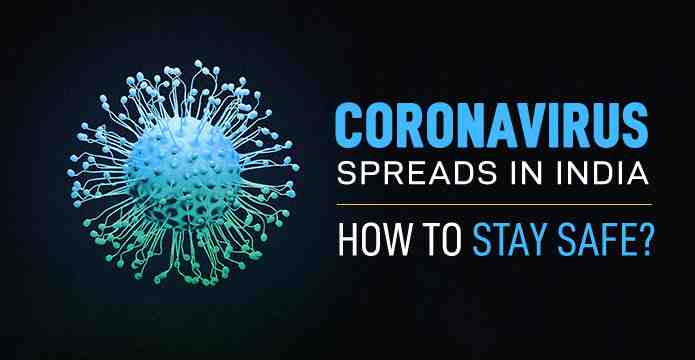Coronavirus in India: Coronavirus Symptoms, Prevention, and Treatments
The deadly unwelcomed outbreak of China’s Coronavirus has revived fresh fears of the epidemic throughout the world. The unforeseen fatal outbreak that originated from China’s Wuhan city has spread beyond its boundaries affecting more than 9,000 lives so far. The date toll across the world hits 213 on Friday, 31st January 2020.
The mysterious 2019-nCoV has not just threatened the health and life but it has stricken threat against the growth of global trade, corporations, and the economy. The abrupt shutdown of trade, offices, schools, local transport, and international flights have harshly hit the marketplace. As the virus escalates across the globe, the World Health Organisation(WHO) has recently declared a global emergency over this perilous outbreak.
The recently compiled reports reveal that more than 120 countries across the globe have confirmed the case of destructive coronavirus. The n-Cov affected areas in the world as per the recent reports include –
-
- Thailand with (at least 14 cases)
- Japan (at least 14 cases)
- Singapore (with at least 13 cases)
- Hong Kong (at least 10 cases)
- Australia (with at least 9 cases)
- Taiwan (with at least 9 cases)
- Malaysia (with at least 8 cases)
- South Korea (with at least 7 cases)
- Macao (at least 7 cases)
- United States (at least 6 cases)
- France (at least 6 cases)
- Vietnam (at least 5 cases)
- United Arab Emirates (at least 4 cases)
- Germany (at least 4 cases)
- Canada (at least 3 cases)
- Italy (at least 2 cases)
- India (at least 1 case)
- Sri Lanka (at least 1 case)
- Philippines (at least 1 case)
- Nepal (at least 1 case)
- Finland (at least 1 case)
- Cambodia (at least 1 case)
Coronavirus Origin
The sudden and novel outbreak of Coronavirus (2019-nCov) was first identified by Chinese researchers. About 59 people were infected in the beginning. The cases were linked to a market in Wuhan City that sold poultry, fishes, and wild animals.
The virus (as the pathogen) prompting a mysterious sickness is transmitted from animals to humans. The disease is communicable from an infected person to the other. Animals are the primary source of the nCov outbreak.
Also Read: Your guide to basic medical terminology
Coronavirus Infection
Research indicates that Coronavirus has a breeding number that fluctuates between 1.4 and 2.5 — which means that 10 patients can transmit the virus to 14 – 25 persons.
However, medical experts suggest that the best way to prevent the spread of Coronavirus is through standard public health measures – inspection, care, the use of personal protection supplies. Basic preventive steps include – hand hygiene, cleanliness, exposure to maintaining the respiratory etiquette can minimize the risk of any grave respiratory infection or any disease that can result in nCov.
Coronavirus Symptoms
Common signs of Coronavirus infection include fever, cough, fatigue.
Respiratory symptoms include breathing problems or shortness of breath. In extreme cases, the Coronavirus infection can cause pneumonia, acute respiratory syndrome, kidney failure, and even death.
Coronavirus Vaccine
Currently, there is no vaccine to prevent coronavirus infection. Government scientists in China, the United States, and Australia, as well as those serving at Johnson & Johnson, Moderna Therapeutics and Inovio Pharmaceuticals, are quickly working to create an antidote or the cure to stop the infection of 2019 – nCov.
- The best way to prevent 2019 – nCov infection is to avoid being exposed to the virus.
- Follow daily precautionary measures to prevent respiratory viruses. Such as washing your hand frequently with soap at least for 20 seconds.
- Use an alcohol-based hand sanitizer.
- Do not touch your face (eyes, mouth, nose) with unwashed hands.
- Cover your mouth and nose while coughing and sneezing.
- Wear a mask if you are suffering from any respiratory diseases.
- Ensure to prevent the infection by wearing a mask while going out every time.
- Avoid close contact with anyone who is bearing even the slightest symptoms of respiratory illness – such as sneezing, coughing.
- Cook your meals thoroughly – especially meat and eggs should be cooked properly before consumption.
- Stay indoors/ at your home when you are sick.
- Use a tissue while sneezing and coughing and throw the tissue immediately in the waste bin.
- Maintain cleanliness every day.
- Disinfect frequently used or touched surfaces and objects.
What steps have been taken to prevent the spread of Coronavirus in India?
The Union Health Ministry has urged the Indians to refrain from traveling to China. The ministry issued a revised travel advisory and even advised the people to monitor their health closely when traveling to China is required. The Indians were asked to use 2487 helpline (011-23978046) for queries related to respiratory infection and promptly seek medical help.
All the citizens returning from China to India after 15 January are advised to undergo a compulsorily medical checkup. The government has forbidden the non-essential travel to China from India.










One Response
Awesome post! Keep up the great work! 🙂